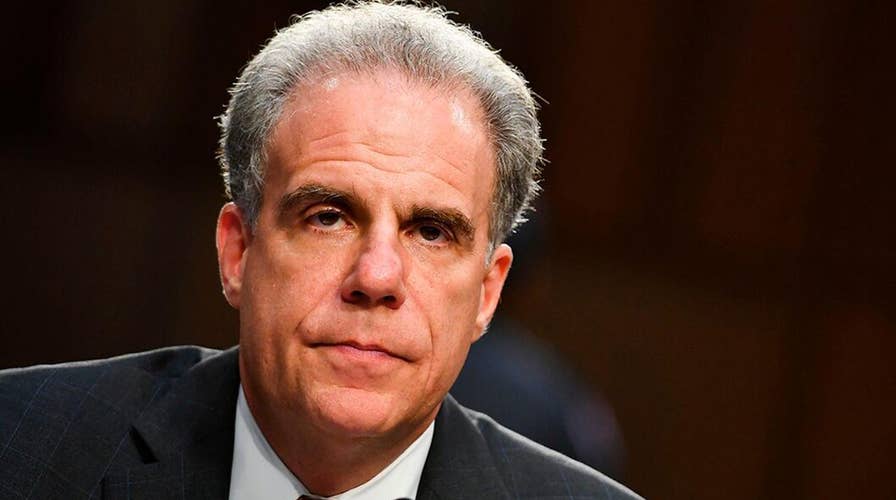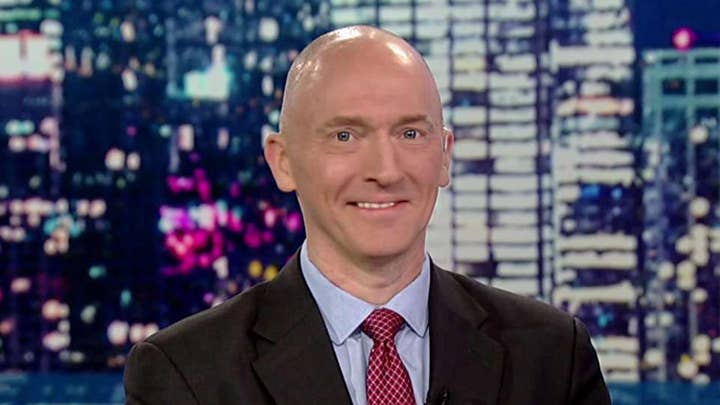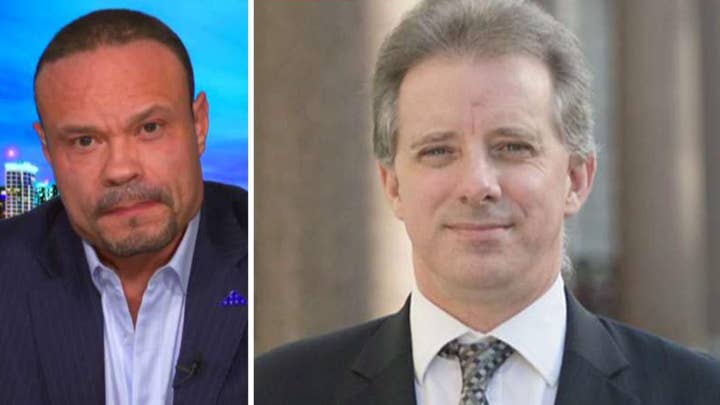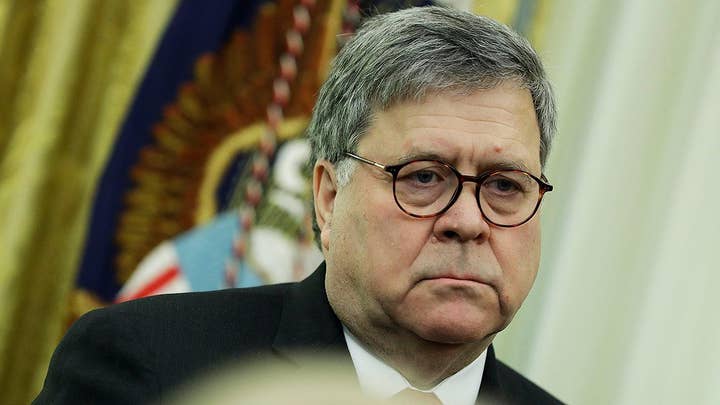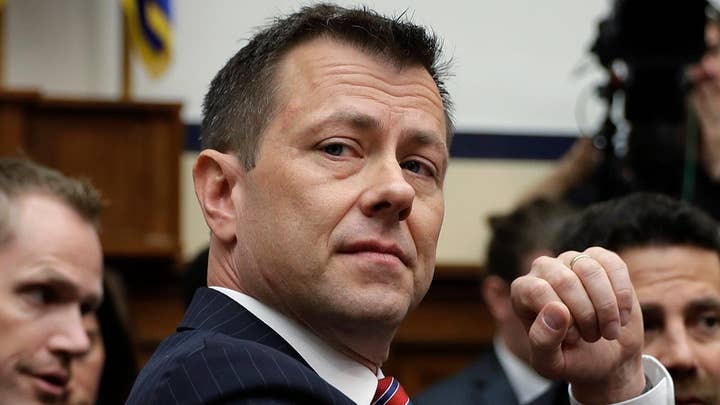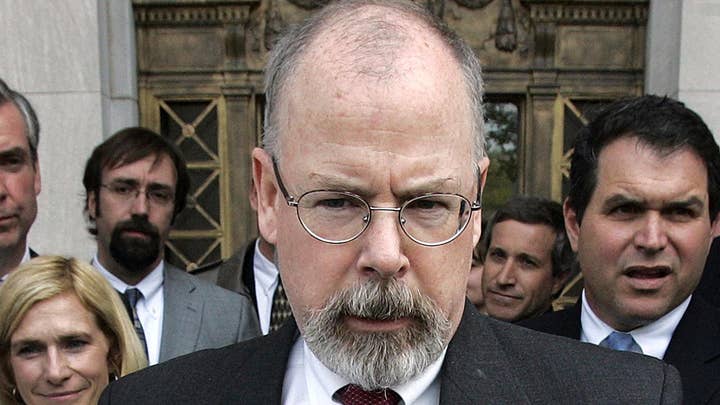Horowitz report expected to find FBI justified in probing Trump campaign, but falsified document
The Justice Department's internal watchdog is set to release a report expected to document misconduct during the investigation into President Trump's 2016 campaign. Gregg Jarrett and Francey Hakes react.
Justice Department Inspector General Michael E. Horowitz on Monday released the highly anticipated findings from his nearly two-year review concerning the origins of the Russia investigation and the issuance of Foreign Intelligence Surveillance Act (FISA) warrants for a Trump campaign official.
Here are some of the biggest takeaways from the 476-page report:
No political bias in launch of probe, FISA applications
The report said investigators found no intentional misconduct or political bias surrounding either the launch of the Trump-Russia investigation or as efforts to seek the controversial FISA warrant to monitor former Trump campaign adviser Carter Page in the early stages of that probe.
"We did not find documentary or testimonial evidence that political bias or improper motivation influenced the FBI’s decision to seek FISA authority on Carter Page," the report said.
It also said key officials, including former FBI Director James Comey and former Deputy Director Andrew McCabe, did not act with political bias. The IG report generally found that agents were justified in launching the investigation known as Crossfire Hurricane, as well as investigations into four Trump associates: Page, former Trump campaign foreign policy adviser George Papadopoulos, former National Security Adviser Michael Flynn and former Trump campaign chairman Paul Manafort.
"[W]e found that each investigation was opened for an authorized purpose and, in light of the low threshold established by department and FBI predication policy, with adequate factual predication," the report said.
'Significant' errors, omissions
Despite the inspector general’s finding that there was no evidence of political bias or improper motivation, Horowitz’s report revealed there were at least 17 "significant inaccuracies and omissions" in the Page FISA applications.
The report said that the FISA applications for Page omitted information that the FBI had obtained from another U.S. government agency detailing its prior relationship with Page, "including that Page had been approved as an 'operational contact' for the other agency from 2008 to 2013."
Another error in the applications was the inclusion of a "source characterization statement asserting that [Christopher] Steele's prior reporting had been 'corroborated and used in criminal proceedings,' which overstated the significance of Steele's past reporting and was not approved by Steele’s handling agent." Christopher Steele is the British ex-spy whose unverified Trump dossier was used to help justify the warrants.
The FISA applications also omitted information regarding the reliability of a key Steele "sub-source," the report said.
Notably, the FISA application also omitted Page's "consensually monitored statements to an FBI" confidential human source saying he "literally never met" Manafort, as well as Papadopoulos' consensually monitored statement to the FBI "denying that anyone associated with the Trump campaign was collaborating with Russia or with outside groups like WikiLeaks in the release of emails."
Steele dossier key in FISA files, despite concerns
Steele’s now-infamous dossier and research surrounding the 2016 presidential election provided much of the information used in the FISA application and renewals, but the inspector general found that the FBI did not have any specific information corroborating allegations against Page from Steele's reporting.
"We determined that prior to and during the pendency of the FISAs the FBI was unable to corroborate any of the specific substantive allegations against Carter Page contained in the election reporting and relied on in the FISA applications, and was only able to confirm the accuracy of a limited number of circumstantial facts, most of which were in the public domain," the report said, noting that the information confirmed was only timing of events and dates when Page traveled to Russia.
In addition to the lack of corroboration, the inspector general found that the FBI's interviews of Steele and his sub-sources "revealed potentially serious problems with Steele’s description of information in his election reports." The report stated that the FBI "failed to notify" the Office of Investigations (OI), which was working on the Page FISA applications, "of the potentially serious problems identified with Steele's election reporting that arose as early as January 2017."
Horowitz added that "even as the FBI developed this information, we found no evidence that the Crossfire Hurricane team reconsidered its reliance on the Steele reporting in the FISA renewal applications."
In addition to the issues surrounding the accuracy of Steele’s information, Horowitz also pointed out that the Crossfire Hurricane team "did not investigate who ultimately paid for Steele’s reporting."
One intelligence analyst told the inspector general’s office that they focused "instead on vetting the accuracy of the information" in the report, "because if the reporting turned out to be true, it would not matter to the team who ultimately paid for the research."
Steele’s reporting was commissioned by opposition research firm Fusion GPS, and funded by the Hillary Clinton campaign and the Democratic National Committee (DNC) through law firm Perkins Coie.
According to the report, former Deputy Attorney General Rod Rosenstein said that if the FBI had information about the Clinton campaign and the DNC funding Steele’s reporting, he "would have expected the FBI to revise the language to be more explicit."
Meanwhile, McCabe, despite the inaccuracies and uncorroborated nature of Steele's report, said he wanted to include that information in an official Intelligence Community Assessment to be delivered to then-President Barack Obama. McCabe told the inspector general's office he believed the Steele reporting needed to be included in that ICA because "President Obama had requested 'everything you have relevant to this topic of Russian influence.'"
But, CIA officials pushed back, arguing that Steele's reporting was simply "internet rumor," and merited inclusion only as an appendix in the final report.
McCabe argued that including it as an appendix was simply "tacking it on" in a way that "would minimize" the information and prevent it from being properly considered—despite Comey's assertion that Steele's reporting was "not ripe enough, mature enough, to be a finished intelligence product."
Ultimately, "the FBI's view did not prevail," and the final ICA report included Steele's reporting only as a short summary in an appendix.
Key figures left in the dark
The inspector general's report revealed that, at times, the Crossfire Hurricane investigation was not properly sharing information with the Justice Department or other key figures who should have been privy to updated information.
According to the report, the inspector general's office found the Crossfire Hurricane team "failed to inform department officials of significant information that was available to the team at the time that the FISA applications" were submitted.
"Much of that information was inconsistent with, or undercut, the assertions contained in the FISA applications that were used to support probable cause, and in some instances, resulted in inaccurate information being included in the applications," the report said, adding that the inspector general believed it was "the obligation" of those agents aware of the information to share it so that "decision makers had the opportunity to consider it, both for their own assessment of probable cause and for consideration of whether to include the information in the applications so that the [Foreign Intelligence Surveillance Court] received a complete and accurate recitation of the relevant facts."
But, because those FBI officials on Crossfire Hurricane failed to do so, officials at the Justice Department who reviewed one or more of the Page applications and renewals -- including former Deputy Attorney General Sally Yates, ex-Acting Attorney General Dana Boente, and former Deputy Attorney General Rod Rosenstein -- "did not have accurate and complete information at the time they approved the applications."
The report continued, "While we do not speculate whether department officials would have authorized the FBI to seek to use FISA authority had they been made aware of all relevant information, it was clearly the responsibility of Crossfire Hurricane team members to advise them of such critical information so that they could make a fully informed decision."
US ATTORNEY DURHAM OBJECTS TO IG FINDINGS ON RUSSIA PROBE ORIGINS IN STUNNING STATEMENT
Meanwhile, Horowitz found that the Trump campaign was not given a defensive briefing — which would take place when U.S. government or corporate officials were being targeted by a foreign adversary and the FBI determined the officials needed to be alerted to the potential threat.
FBI officials decided not to give the campaign that briefing, saying it would create the risk that "if someone on the campaign was engaged with the Russians, he/she would very likely change his/her tactics and/or otherwise seek to cover-up his/her activities, thereby preventing us from finding the truth."
Horowitz determined that the decision to do so was "left to the discretion of FBI officials."
The report also cited concerns that the FBI did not have to loop in senior DOJ officials before sending confidential human sources to interact with members of Trump’s campaign.
"We found it concerning that department and FBI policy did not require the FBI to consult with any department official in advance of conducting CHS [Confidential Human Source] operations involving advisors to a major party candidate's presidential campaign, and we found no evidence that the FBI consulted with any department officials before conducting these CHS operations," the report stated, noting that in the future, "department consultation is required when tasking a CHS to interact with officials in national political campaigns."
Use of confidential human sources
The inspector general revealed that the FBI’s Crossfire Hurricane team indeed used "Confidential Human Sources" to contact and record conversations with Page, Papadopoulos and another "high-level" campaign official who was not a subject of the probe.
"All of these interactions were consensually monitored and recorded by the FBI," the report stated, noting that the recorded interactions took place before and after Page and Papadopoulos were advisers on the campaign.
Horowitz determined that the use of confidential human sources "complied" with the requirement that "investigative activities be conducted for an authorized purpose."
But, the report revealed that the Crossfire Hurricane team omitted several key statements made by Page and Papadopoulos during those recorded interactions. The report revealed that Page made statements to the confidential human source that "would have, if true, contradicted the notion that Page was conspiring with Russia" and "that contradicted the Steele reporting received by the team."
In those meetings, Page said he had "literally never met" or "said one word to" Manafort, and Papadopoulos denied that anyone associated with the Trump campaign was collaborating with Russia or outside groups such as WikiLeaks in the release of hacked DNC emails. Both of those statements were omitted in FISA applications and from reports to other officials.
The report stated that investigators "found no evidence the FBI made Page's statements from this confidential human source meeting" available to higher-ups in the Office of Investigations or in the National Security Division "until mid-June 2017."
Meanwhile, the inspector general's office also investigated Papadopoulos' allegation that the FBI used Maltese professor Joseph Mifsud to pass information to Papadopoulos as a setup to launch the Crossfire Hurricane investigation.
TRUMP REACTS TO DOJ WATCHDOG HOROWITZ'S REPORT, SAYS WHAT WAS DONE WAS A 'DISGRACE'
Horowitz said they did not find any records or evidence indicating that Mifsud was an FBI confidential human source or that his conversations with Papadopoulos were part of any FBI operation, and none of the witnesses interviewed had any information to support the allegation.
Prior to the 2016 election, Papadopoulos met in London with Mifsud, who told him the Russians had dirt in the form of emails that could damage Hillary Clinton's presidential campaign. Papadopoulos then told Australian diplomat Alexander Downer of the new information. Downer reported Papadopoulos' comments to the FBI.
Papadopoulos has long said he felt he was being spied on, telling Fox News that he met with longtime FBI informant Stefan Halper and his female associate, who went under the alias Azra Turk. Papadopoulos told Fox News he saw Turk three times in London: once over drinks, once over dinner and once with Halper. He also told Fox News back in May that he always suspected he was being recorded.
Neither Halper nor Turk’s names were mentioned in Horowitz’s report.
The report also revealed that the Crossfire Hurricane team was "interested in seeking FISA surveillance targeting" Papadopoulos, but FBI attorneys were not supportive.
Priestap started probe, didn’t want Strzok on board
It has been long-reported that ex-counterintelligence agent Peter Strzok was the FBI official who formally opened the Crossfire Hurricane investigation in July 2016, but the inspector general report revealed that it was actually his supervisor, Bill Priestap, who ultimately made the decision.
Priestap’s decision to open the probe was based on a consensus reached by after multiple days of meetings that included Strzok, McCabe, the FBI general counsel and FBI deputy general counsel, the report said.
It also revealed that Priestap "originally wanted to assign the investigation to a deputy assistant director other than Strzok, because, although he had confidence in Strzok's counterintelligence capabilities, he had concerns about Strzok's personal relationship with Lisa Page affecting the Crossfire Hurricane team."
Strzok and Page, an FBI lawyer, were romantically involved.
Durham objects
U.S. Attorney from Connecticut John Durham, who has been conducting a wide-ranging investigation of the origins of the Trump-Russia investigation, released a rare statement after Horowitz's report was made available to the public on Monday, saying he disagreed with the inspector general's conclusions.
"Based on the evidence collected to date, and while our investigation is ongoing, last month we advised the inspector general that we do not agree with some of the report's conclusions as to predication and how the FBI case was opened," Durham said in a statement Monday.
CLICK HERE TO GET THE FOX NEWS APP
"I have the utmost respect for the mission of the Office of Inspector General and the comprehensive work that went into the report prepared by Mr. Horowitz and his staff," Durham said. "However, our investigation is not limited to developing information from within component parts of the Justice Department. Our investigation has included developing information from other persons and entities, both in the U.S. and outside of the U.S."
Fox News reported in October that Durham's ongoing probe has transitioned into a full-fledged criminal investigation, meaning he had the ability to charge individuals.








































